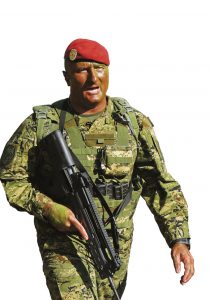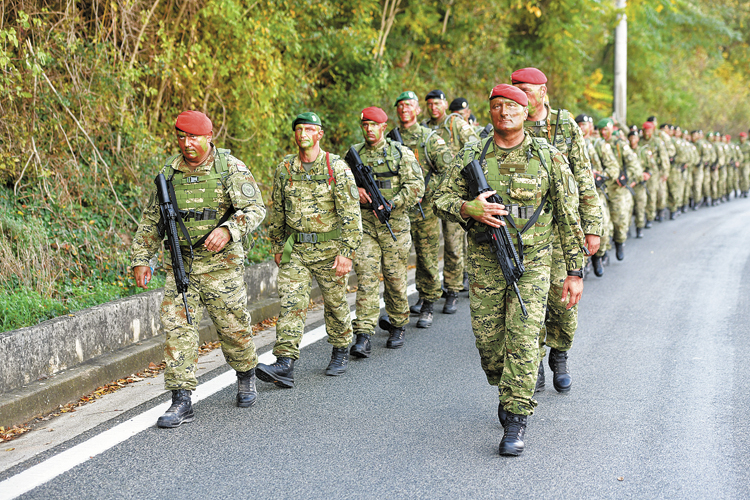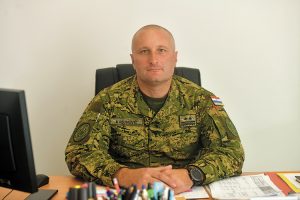“Vukovar is a symbol of the suffering, and of the freedom and togetherness of Croatia”"Vukovar…
Once We Arrived at Knin Fortress, Fatigue Was Replaced by Pride…
 After the Marko Babić Leadership Development Centre had been opened at Josip Jović Barracks in the town of Udbina in mid-September, following demanding preparations and a selection of trainees and personnel, the first pilot training in leadership development was concluded in late October. The newly-established centre is expected to ultimately increase the overall readiness of the Croatian Armed Forces. The first training, the final march and satisfaction with the trainees were the topics of our interview with the centre’s commander, Lt. Col. Tomislav Kasumović.
After the Marko Babić Leadership Development Centre had been opened at Josip Jović Barracks in the town of Udbina in mid-September, following demanding preparations and a selection of trainees and personnel, the first pilot training in leadership development was concluded in late October. The newly-established centre is expected to ultimately increase the overall readiness of the Croatian Armed Forces. The first training, the final march and satisfaction with the trainees were the topics of our interview with the centre’s commander, Lt. Col. Tomislav Kasumović.
The first pilot leadership development training is behind you. Looking back on it, did everything go according to plan? Have the Croatian Armed Forces been enriched with new leaders?
The first pilot training was conducted from 13th September to 30th October in training facilities at Josip Jović Barracks in Udbina and, to a lesser extent, on locations around Lika-Senj County. The staff at the Marko Babić Leadership Development Centre worked with 60 trainees, supported by personnel from superior commands and other organizational units of the Croatian Armed Forces. During several weeks of intensive training, which took up 17 hours a day on average, the trainees acquired skills and knowledge in programme areas such as situational leadership, small unit tactics, infantry weapons with firing tasks, topography, NBC defence, elements of SERE training, mines and explosive ordnance, first aid, combat, physical training, etc. They took part in a 48-hour field exercise and an 88-kilometre march from Josip Jović Barracks in Udbina to Knin [a town in Dalmatian hinterland], which was completed in under 32 hours. Our objective – to conduct training in all programme areas within the allotted timeframe – was achieved. Overall, 43 trainees successfully completed the training and attained the required skills and knowledge in the domain of small unit tactics which enable them to independently plan, organize, conduct and analyse training in their parent units. In other words, the conditions in the training elevated the potential for the acquisition of leadership skills.
How did the final march from Udbina to Knin Fortress go? What motivated you to march those 88 kilometres? What was the reaction from the inhabitants of the settlements you passed through?
The final infantry march (27-28 October) was the climax of the leadership development training and was concluded with the arrival at Knin Fortress, where graduation certificates and metal badges were presented to all the trainees who had successfully completed the course. The march itself was dedicated to all fallen, deceased and missing combatants as well as disabled veterans of Croatia’s Homeland War of Independence [1991 – 95]. They were the greatest source of inspiration to us during the march. Preparations for the march included scouting the areas we would be passing through and drafting an itinerary; as this was our first march, the preparations had to be thorough. While making preparations for the march and the graduation ceremony on Knin Fortress, we receive great help from the Croatian Army Command, the Fran Krsto Frankopan Training and Doctrine Command, the Guards Mechanized Brigade, the Guards Armoured Mechanized Brigade and other units and commands. Without their support, the final march would have been a lot more difficult to endure. The participants in the march included staff and trainees of the Marko Babić Leadership Development as well as staff of the Fran Krsto Frankopan Training and Doctrine Command. During the march, we passed through places such as Udbina, Ondić, Gračac and Otrić before finally arriving at Knin. Along the way, we were cheered on and enthusiastically greeted by the inhabitants of those places, which pleased us and inspired us even more. We felt proud and accepted, and those feelings came to the forefront more and more with each kilometre that brought us nearer to the former royal residence of Croatian king Zvonimir (AD 1075 – 1089). As we were entering Knin, our thunderous singing attracted people to the streets and we completed the march to the sounds of applause and ovations. We were overcome with emotions and energy as we climbed on the fortress, where more than 300 guests were waiting for us. When we stepped on Knin Fortress, pain and fatigue were gone and only one feeling remained – pride.
 Did the trainees live up to your expectations? The training must have been too taxing for them since 60 started the training, but only 43 made it to the graduation ceremony on Knin Fortress.
Did the trainees live up to your expectations? The training must have been too taxing for them since 60 started the training, but only 43 made it to the graduation ceremony on Knin Fortress.
I am pleased with the level of motivation and earnestness with which the trainees approached the training. The training programme at the Leadership Development Centre ranks among the most demanding and challenging training programmes in the Croatian Armed Forces, so it does require full commitment and sacrifice. In my speech at the opening of the Marko Babić Leadership Development Centre, I stressed that the training was not for the fainthearted and that only the most persistent ones would be able to complete it. That is exactly what happened. During the training, a certain number of trainees could not meet the high standards and returned to their parent units. These trainees will be given one more opportunity to prepare more adequately and try to prove themselves at the next training in spring 2020. Other trainees manifested the required level of readiness and motivation, completed the training successfully and are fully entitled to wear the badge of Marko Babić Leadership Developemnt Centre. In what follows, I will explain why the pass rate was so low. The specific quality of this training is that trainees not only have to be well versed in tactics, techniques, procedures and combat, but are also placed in simulated combat conditions and have to carry out tasks while under constant pressure. Three elements have to come together in order for a leader to be developed: combat skills, leadership as well as mental and physical readiness. What does that mean? Simply put, a leader is not just a soldier with excellent command of combat skills (e.g. marksmanship, tactics, topography, etc.) or a soldier who can endure great exertions for a long time. Rather, a leader is a soldier who brings all of those combat skills together and has mental and physical endurance, but is also capable of leading others under conditions of intensified stress. The trainees are impelled to solve problems, make quick decisions, plan, organize and execute an assignment as well as lead others. In such circumstances, a soldier cannot rely solely on their physical abilities; they need to do more than just carry out individual tasks impeccably. The Leadership Development Centre looks for soldiers who are capable of leading others under extremely difficult conditions. Here, personality and intelligence, as the two main elements in the development of good leaders, play a key role.
How do you explain the fact that the oldest trainee – SSgt. Hrvoje Čavić of the 2nd Mechanized Battalion Gromovi (Thunders) – was named the best trainee? Does this mean that younger soldiers are physically weaker and find it more difficult to endure pressure and stress?
Before I answer this question, I wish to once again congratulate the best trainee, SSgt. Hrvoje Čavić of the 2nd Mechanized Battalion Gromovi (Thunders), for the success and results he has accomplished. I also wish to extend my congratulations to other forty-two trainees for successfully completing the leadership development training. I find Staff Sergeant Čavić to be first among equals. Choosing the best trainee is an exacting procedure that includes a triple filter. The first filter is the trainees, who anonymously vote for the best one among them. The trainees who receive more votes than all others are singled out. The second filter is the results of sociometric research carried out in conjunction with a team of military psychologists. The results of the research provide an insight into the social dynamics among the trainees and have proven to be useful in the process of choosing the best trainee. Finally, the third filter is a committee made up of instructors at the Marko Babić Leadership Development Centre, who state their opinions about the trainees that, in their opinion, meet the criteria (e.g. above average results in task execution) for being chosen as top of the class. The best trainee is the person who passes all three filters. In this case, that was Staff Sergeant Čavić, whom I once again congratulate. The fact that he was also the oldest trainee in the leadership development training only goes to say that age is not and can never be an excuse for failure. It also shows how important grit is; it might even be more important that physical endurance. That does not mean that other trainees did not have grit. They most definitely had it or they would have never completed the training.
Have you already made an analysis of the inaugural training? Do you think any changes should be made to it? How realistic is it for soldiers to be transformed into motivated, trained and competent leaders in only a few weeks?
Now that the inaugural training is behind us, the centre’s staff have to make a detailed analysis of it, note down lessons learnt as well as make adjustments to the training concept and programme. It is too early to speak of any changes because we first have to make a detailed analysis and co-ordinate a joint stance about the direction in which the centre is to be developed with superior commands and other units within the Croatian Armed Forces. Our vision is for the Marko Babić Leadership Development Centre to become the leading centre for the training of combat leaders in the Croatian Armed Forces, with the primary focus placed on the application of small unit tactics. Besides, the centre’s mission clearly states that it wishes to enhance leaders’ combat skills on tactical level through demanding, high-energy combat training so as to prepare them for challenges that come with leading units in combat. By setting clear goals and a clear vision of the type of soldier that the Croatian Armed Forces wish to build up, we will form a foundation for proposing amendments to the training programme that will support the development of leaders that the Croatian Armed Forces truly need. Naturally, one cannot become a leader in six or seven weeks. Becoming a leader is a continuous process that lasts throughout one’s military career and requires a lot of work. The centre’s staff can create optimal conditions that stimulate the development of leadership skills. In other words, the leadership development training is free of hindrances and limitations. Under practically laboratory conditions, we experiment in training and apply different training methods. Trainees are shown how to perform in conformity with established standards while under intensive stress. During the training, they are given various roles and specific tasks which are deliberately set up in such a way that the trainees are not given enough information, resources or time to prepare. We want to see them succeed in planning, organizing and fully carrying out an assignment in realistic circumstances, when they are lacking information, resources and time. So, the training is just the first step in leadership development, which must be continued upon the trainees’ return to their parent units.
What are the impressions of instructors who led the training?
Instructors were involved in every step of the training, directly following the trainees’ work and noting down their results. The instructors have long-time experience in training as well as the required knowledge and experience; many of them had fought in the Homeland War. I find that they went all out in the training and the trainees’ results show that. During the training, co-ordination meetings about the training and the trainees were held on a daily basis, so that information flowed and experiences were exchanged without hindrance. I can therefore conclude without a speck of doubt that the instructors are pleased with the training and the results. The training has generated quite a few observations and proposals for improvement from the instructors, which goes to show how earnestly they approached the training and the trainees.
The Marko Babić Leadership Development Centre in Udbina is modelled after the former Damir Tomljanović Gavran Guards Brigade Specialist NCO Training Centre in Šepurine, on the island of Prvić. How different is the new centre from the old one? Is the training in the new centre adequately suited to peacetime circumstances, contemporary security threats and the current organization of the Croatian Armed Forces?
The Marko Babić Leadership Development Centre is based on the idea of the former Damir Tomljanović Gavran Guards Brigade Specialist NCO Training Centre and their concepts are similar. The development of a professional and authoritative NCO has existed as an idea since the 1990s. The difference between the Damir Tomljanović Gavran Guards Brigade Specialist NCO Training Centre and the Marko Babić Leadership Development Centre is that the latter employs methods, techniques, tactics and procedures suitable to modern times and modern challenges. The development of technology has changed the form of warfare and that has greatly affected the evolution of modern leaders’ training. Contemporary systems, weapons and protective equipment have changed the form of warfare in the sense that the contemporary soldier is more murderous and more protected than before. In the training, we make use of the same experiences and methods that are also employed by some of the most renowned leadership development centres in the world. Experiences from education and training at foreign military academies and leadership development centres are applied in our centre and we are sure to achieve results. The Croatian Armed Forces are a military with modern organization and they do not lag behind other militaries, as I have personally been convinced of numerous times. The training in the Croatian Armed Forces does not lag behind the training in other militaries, either. I was trained and educated in the USA for a number of years; I went to military academy there, completed the advanced officer course there and graduated from the Dwight D. Eisenhower School for National Security and Resource Strategy at the National Defense University in Washington, D.C., which is the highest (strategic) level of education. With full responsibility, I claim that the training at the Leadership Development Centre meets the criteria of modern training and is suited to contemporary security threats. It should be noted that the vision of the centre’s development foresees the inclusion of foreign trainees, which confirms the centre’s potential to conduct training on an international level.
Is the training at the Marko Babić Leadership Development Centre in any way in collision with the Leadership Development Course? Do you believe that all enlisted personnel who wish to become NCOs should complete the training in Udbina?
It is important to differentiate two things. On the one hand, the Leadership Development Course is, as the name says, a course and knowledge is acquired there. On the other hand, training is conducted at the Marko Babić Leadership Development Centre. That is the key difference between those two things; training entails acquisition of new skills and capabilities through practice only. The prospective institutional positioning of the Marko Babić Leadership Development Centre will provide an answer to your other question. I believe that both NCOs and officers should undergo training at this centre. When I say NCOs, I primarily refer to those who are in consideration for leading teams and squads or being appointed platoon sergeants. As far as officers are concerned, the ones at starting leadership position (platoon leaders) should take part in the training. Both groups are directly involved in leading soldiers on the field and no difference should be made between them. Finally, one does not become an NCO or an officer through leadership development training; that is mission of the Leadership Development Course. The leadership development training has one objective only – to develop leaders.
 When will the next class commence with training?
When will the next class commence with training?
The next class of trainees will begin their training in the spring of 2020. The second pilot training will be conducted next year, thus rounding out the process of drafting the training concept and programme. Afterwards, depending on the guidelines from superior commands, several classes a year will undergo training. Also, cadets of the Franjo Tuđman Croatian Defence Academy, officers (lieutenants) of the Croatian Armed Forces and foreign trainees will gradually be included in the training.
Have the armed forces of Croatia’s partner and allied countries already expressed an interest in the training? When do you expect them to join the Croatian Armed Forces in the training?
As far as I know, the armed forces of our partner and allied countries are interested in taking part in the leadership development training. However, as this centre has just started operations, we are focused on attaining full operational readiness, which should occur in the autumn of 2020. By then, we wish to fulfil the preconditions for the reception of foreign trainees. Once that has been done, we will begin to conduct the training on an international level.
Interview by MARTINA BUTORAC
Photo by TOMISLAV BRANDT
Translation by IVA GUGO
